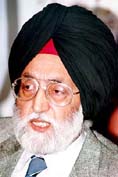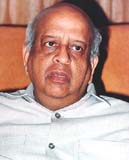Commentary/Vir Sanghvi
Delays in choosing top bureaucrats belittles the job
Don't delay
Why doesn't government make up its mind sooner?
 Last week M S Gill (right) took over as chief election commissioner from
T N Seshan. There was nothing particularly surprising or unexpected
about this appointment. Gill had served as an election commissioner
during Seshan's tenure and had officiated as chief election commissioner
during his absences. Last week M S Gill (right) took over as chief election commissioner from
T N Seshan. There was nothing particularly surprising or unexpected
about this appointment. Gill had served as an election commissioner
during Seshan's tenure and had officiated as chief election commissioner
during his absences.
Moreover, few would dispute that Gill is clearly the right man
for the job. Unlike his colleague, the distinguished but somewhat
more emotional G V G. Krishnamurthy, he consistently refused
to be provoked by Seshan's hectoring, bullying attitude and kept
his cool through the former chief election commissioner's most
megalomaniacal excesses.
His own credentials are also impressive. A well-respected civil
servant, he is an expert on agricultural issues and was favourite
for the post of cabinet secretary when Zafar Saifullah got the
job.
Given this background, Gill's appointment should have been a foregone
conclusion. But nothing is ever that simple in India.
 On the day that Seshan (left) retired, the government had still not nominated
his successor -- there was talk of asking Gill to officiate till
the new man could be named. Nor did anybody take it for granted
that Gill would get the job. Several others were reported to be
in the race, and judging by the tone of the press coverage, Gill
was not even the favourite. On the day that Seshan (left) retired, the government had still not nominated
his successor -- there was talk of asking Gill to officiate till
the new man could be named. Nor did anybody take it for granted
that Gill would get the job. Several others were reported to be
in the race, and judging by the tone of the press coverage, Gill
was not even the favourite.
Finally, long after he should have done so, Law Minister Ramakant
Khalap told the press -- on an unattributable basis -- that the
government had chosen Gill. Even so, the nomination took its time
in coming through and when Seshan stepped down, the post became
vacant.
The suspense was avoidable and unnecessary. It had the effect
belittling Gill who had to read speculation in the media day after
day. It annoyed Krishnamurthy, who finally exploded with one or
two remarks to the media (about his seniority as compared to Gill's)
that he probably would not have made if it had not been for the
tension.
Ultimately, the delay belittled the job.
The suspense surrounding the appointment of a new chief election
commissioner is symbolic of the way in which things are now done
in India.
In the case of nearly every major government appointment, the
same attitude rules. I cannot understand why this should be so.
In each case, the circumstances are much the same. The government
only has to decide whether it wishes to give the incumbent an
extension or choose one out of three or four contenders (at the
most).
The identities of the contenders are no secret. In the race for
cabinet secretary, there are usually two or three civil servants
with the requisite seniority. The same is true for the selection
of the foreign secretary. And yet, nobody even bothers to examine
the issue till the last moment and even then, there is no guarantee
that any decision will be taken.
While the delay has long been institutionalised, things got really
bad in the P V Narasimha Rao era. Both Rajiv Gandhi and V P Singh
were very clear that they wanted their own men in key jobs and
were not shy of saying so openly. Rajiv made Seshan cabinet secretary
over the objections of everybody who mattered because he wanted
a loyalist in the job during an election year. And V P Singh
was so certain that he wanted Vinod Pande to replace Seshan that
he did not worry too much about the details of the seniority principle.
Unfortunately, Narasimha Rao's famous indecisiveness led him to
avoid taking any decisions at all about personnel matters -- if
he could help it. The race for cabinet secretary -- which Zafar
Saifullah eventually won -- must rank as one of the lowest points
in our administrative history.
|





 Last week M S Gill (right) took over as chief election commissioner from
T N Seshan. There was nothing particularly surprising or unexpected
about this appointment. Gill had served as an election commissioner
during Seshan's tenure and had officiated as chief election commissioner
during his absences.
Last week M S Gill (right) took over as chief election commissioner from
T N Seshan. There was nothing particularly surprising or unexpected
about this appointment. Gill had served as an election commissioner
during Seshan's tenure and had officiated as chief election commissioner
during his absences.
 On the day that Seshan (left) retired, the government had still not nominated
his successor -- there was talk of asking Gill to officiate till
the new man could be named. Nor did anybody take it for granted
that Gill would get the job. Several others were reported to be
in the race, and judging by the tone of the press coverage, Gill
was not even the favourite.
On the day that Seshan (left) retired, the government had still not nominated
his successor -- there was talk of asking Gill to officiate till
the new man could be named. Nor did anybody take it for granted
that Gill would get the job. Several others were reported to be
in the race, and judging by the tone of the press coverage, Gill
was not even the favourite.